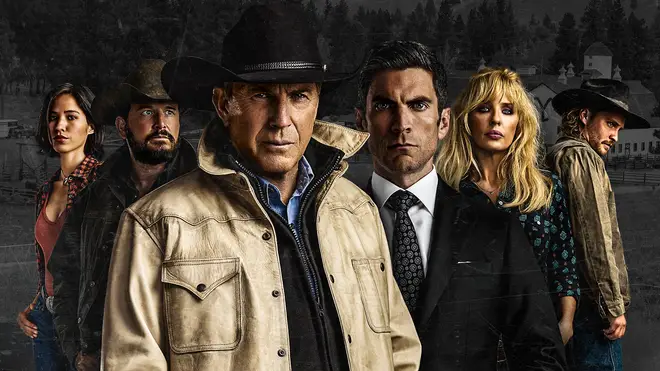
The Dust Settles, the Lies Remain: Deconstructing the Yellowstone Season 5 Finale and Pondering the Dutton Dynasty's Future
The dust kicked up by horses' hooves has barely settled on the sprawling Montana landscape, yet the echoes of Yellowstone's Season 5 finale reverberate through the fandom. More than a cliffhanger, it felt like a fracturing – a splintering of the Dutton family, the land they cling to, and the very narrative that has driven the series for years. This is not just a story about cowboys and cattle; it's a Shakespearean tragedy played out against the backdrop of the American West, and the Season 5 finale laid bare the raw nerves and unresolved conflicts that threaten to tear it all apart.
Behind the scenes, the production has been plagued with its own drama, mirroring the on-screen tension. Rumors of scheduling conflicts, particularly surrounding Kevin Costner's commitment to his own Western film series, "Horizon," have cast a long shadow over the future of the show. This off-screen conflict has undeniably influenced the on-screen narrative, forcing the writers to navigate a delicate dance between honoring established storylines and preparing for a potentially significant shift in the show's landscape. The original plan for a two-part Season 5 appears to have been jettisoned, leaving viewers with a half-baked resolution and a host of unanswered questions. This sense of unease and uncertainty bleeds into the viewing experience, making it difficult to fully embrace the dramatic twists and turns.
The "truth," as far as Yellowstone is concerned, is a slippery, often contradictory concept. The Duttons operate in a world where morality is fluid and the ends justify the means. John Dutton, patriarch and governor, embodies this ambiguity. He's a ruthless pragmatist willing to bend, break, and outright ignore the law to protect his family and his land. This season saw him wield his gubernatorial power with increasing audacity, blurring the lines between public service and personal gain. He leveraged state resources to fight his personal battles, using the governor's office as an extension of the Yellowstone Ranch. This manipulation of power, though consistent with his character, raises profound questions about the cost of protecting the ranch and the legitimacy of his methods. The truth, then, is not a single, unwavering principle, but a shifting terrain defined by the Duttons' self-preservation.
The finale itself presented a stark picture of the Dutton dynasty teetering on the precipice. Jamie, fueled by years of simmering resentment and a newfound ambition for power, declared war on John. He orchestrated impeachment proceedings, pulling at the threads of John's gubernatorial legitimacy and threatening to unravel his hard-won control. Meanwhile, Beth, ever the loyal enforcer, responded with characteristic ferocity, meticulously plotting Jamie's downfall. Their sibling rivalry, always a central element of the show, escalated to a full-blown existential threat to the entire family. It's a battle not just for power, but for the very soul of the Dutton legacy.
Furthermore, the finale showcased the widening cracks in the other branches of the Dutton family tree. Kayce's ominous vision, hinting at a devastating choice between his wife and his family, foreshadows a future filled with heartache and impossible decisions. Monica's unwavering loyalty to Kayce and her growing spiritual connection to the land suggest a deeper understanding of the sacrifices required to maintain their way of life. Rip, John's unwavering right-hand man, remained steadfastly loyal, but even his loyalty may be tested as the family descends further into conflict. The future of the Duttons, therefore, is shrouded in uncertainty, threatened by internal strife, external pressures, and the weight of their own past.
Looking ahead, the future of the Duttons hinges on several key factors. First and foremost, the resolution of the off-screen drama surrounding Costner's involvement will be crucial. How the writers choose to navigate his departure, if indeed he departs, will significantly shape the narrative. Will they kill off John Dutton, paving the way for a new generation to take the reins? Or will they find a way to keep him involved in a reduced capacity?
Beyond the production logistics, the series must address the moral complexities it has raised. Can the Duttons continue to operate with impunity, bending the rules to their advantage? Or will they be forced to confront the consequences of their actions? The simmering tensions between Jamie and Beth suggest a potential showdown, a battle for the future of the ranch that could leave lasting scars on the family. Ultimately, the future of the Duttons depends on their ability to reconcile their conflicting desires – the desire for power, the desire for land, and the desire for family.
In conclusion, the Season 5 finale of Yellowstone left viewers with more questions than answers. Behind the scenes drama, coupled with the ever-shifting moral landscape of the show, has created a sense of unease and uncertainty. The truth, as the Duttons know it, is a weapon, a tool used to protect their interests. The future of the family, however, hangs in the balance, threatened by internal conflict and the weight of their own legacy. As the dust settles, one thing remains clear: the story of the Duttons is far from over, and the next chapter promises to be even more dramatic, complex, and ultimately, tragic.
